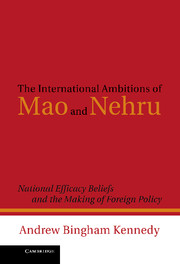 The International Ambitions of Mao and Nehru
The International Ambitions of Mao and Nehru 8 - Determined Diplomacy
Published online by Cambridge University Press: 05 January 2012
Summary
If we have attained some respect in the eyes of other countries in the world, it is because we have spoken with some sense of responsibility, with some sense of, not condemning but, trying to win over the other people.
Jawaharlal Nehru, May 1957The preceding chapter explored how Nehru's strong sense of moral efficacy, and limited sense of martial efficacy, shaped India's response to the first war over Kashmir. In keeping with Nehru's beliefs, India's approach was marked by an ambitious diplomatic strategy and relative restraint on the military side. Yet it remains to be seen how well this pattern of policy was sustained subsequently. Did Nehru continue to cooperate proactively, notwithstanding the difficulties India had before the UN Security Council in 1948? And did he continue to shy away from daunting military challenges?
There is no question that Nehru remained intensely interested in diplomacy as a tool of statecraft following the Kashmir conflict. Under Nehru's lead, India was actively involved in efforts to restore peace to the Korean Peninsula in 1953 and to defuse the Indochina crisis in 1954. Although these peacemaking efforts did not entail costly gestures on India's part, other initiatives did. Nehru's espousal of nonalignment, for example, was an act of political restraint that sought to inspire comparable restraint on the part of other states. This high-profile campaign against the Cold War alliance system, in turn, came with a price: it complicated New Delhi's relations with Washington in the 1950s, particularly as the latter worked to develop a network of alliances in Asia. Nehru's boldest diplomatic effort, however, was his campaign for nuclear disarmament. Unlike Mao, Nehru did not simply call for the superpowers to disarm while quietly developing his own country's nuclear weaponry. Instead, the Indian prime minister constrained his own country's nuclear program both unilaterally and multilaterally in an effort to elicit comparable restraint from other states. In doing so, he could not have known whether India's restraint would be emulated or exploited.
- Type
- Chapter
- Information
- The International Ambitions of Mao and NehruNational Efficacy Beliefs and the Making of Foreign Policy, pp. 201 - 237Publisher: Cambridge University PressPrint publication year: 2011


